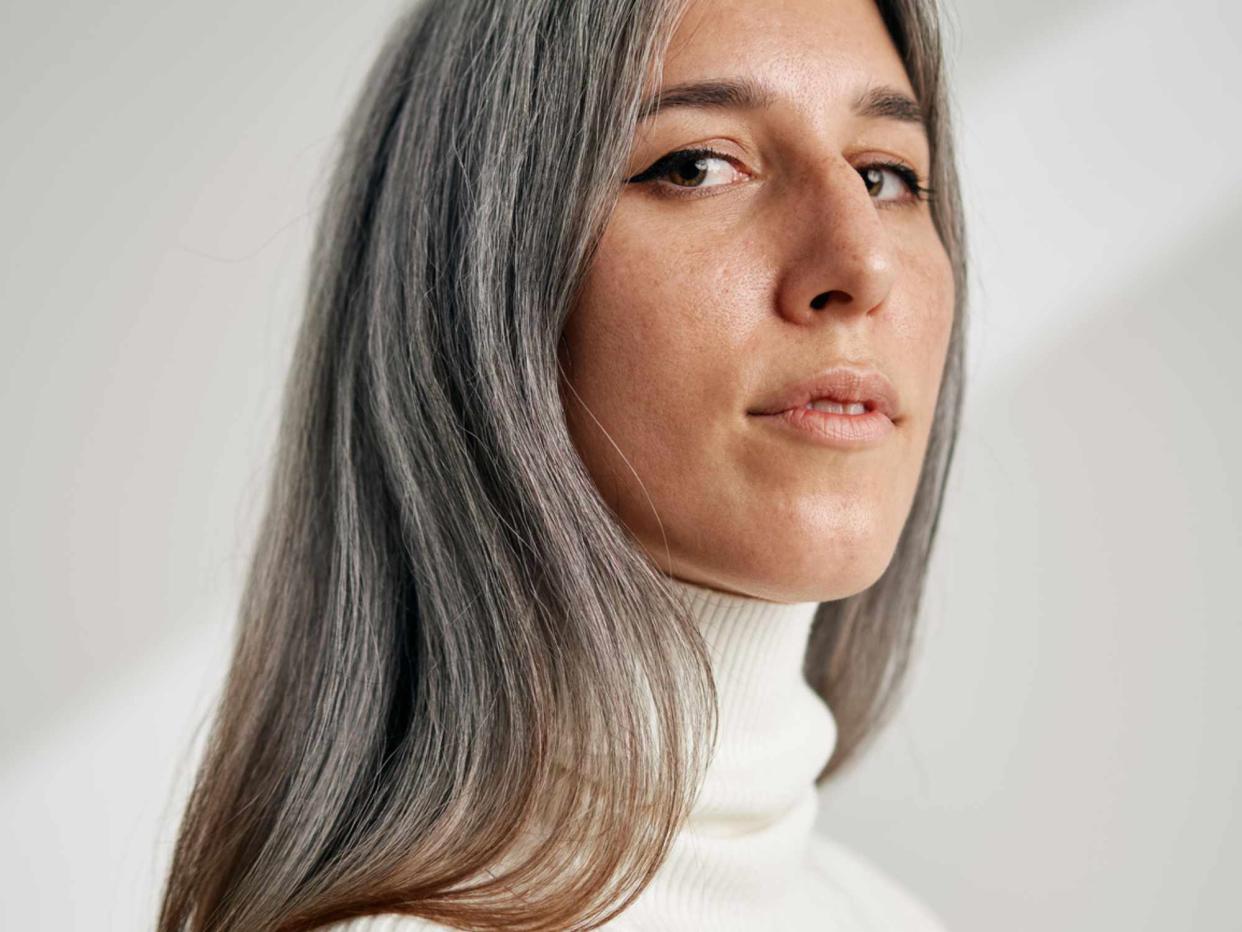6 Ways to Prevent Gray Hair, According to Dermatologists

Stocksy
Reviewed by Julia A. Siegel, MD
With age comes wisdom and changes in physical appearance—namely, the graying of hair. It's completely a natural evolution that goes alongside the privilege of getting older, much like acquiring wrinkles, stretch marks, and smile lines. But if you're not ready to fully embrace your silver strands just yet (with a cool, silvery hairstyle, of course), there are ways you can prevent or slow down the process,
First, you should know that the consensus among scientists and medical professionals is that the root cause of gray hair lies in genetics. The earlier your parents and grandparents went gray, the earlier you will, too. But that doesn't mean there aren't some preventative measures you can take—and we're not just talking about just preemptively dyeing your hair. To gather more info on the greying process and get tips on how to slow it down, we spoke with top dermatologists Michele J. Farber, MD, and Marisa Garshick, MD, plus hairstylist and Global Vice President of Education at Colorproof Tim Abney. Keep reading to learn how you can prevent gray hair from happening in the first place, according to the experts.
Meet the Experts
Michele J. Farber, MD, is a board-certified dermatologist at Schweiger Dermatology Group in Philadelphia, PA.
Marisa Garshick, MD, is a board-certified dermatologist and clinical assistant professor at Cornell University.
Tim Abney is a hairstylist and the Global Vice President of Education at Colorproof.
What Causes Gray Hair?
Hair follicles contain pigment cells that produce melanin, the pigment that provides color to the hair as well as the skin. "Over time, these pigment cells in the hair produce less and less pigment and eventually stop producing pigment, leading to grey hair," according to Farber.
How fast—and at what age—graying of the hair begins is determined by genetics, stress, and environmental factors, she adds.
When Does Hair Begin to Gray?
It is typical to see hair graying occur once you're in your 30s or 40s, and most people have a significant amount of gray hair in their 50s-60s. Premature graying is defined as the graying process starting in your 20s, according to Farber.
“Premature graying is thought to be genetic and may even be related to a specific gene known as interferon regulatory factor 4 (IRF 4), which may help to regulate melanin production,” Garshick tells Byrdie. “Additionally, there are some genetic conditions that may be associated with premature graying."
Where Does Gray Hair Appear on the Scalp?
Typically, gray hairs spring up all over the scalp rather than in sections. However, Farber says, "In certain medical conditions, like vitiligo, alopecia areata, and inherited pigment disorders, hair can appear in grey patches."
How to Prevent Gray Hair
Get Enough Vitamins and Nutrients
"Living a healthy lifestyle and ensuring a balanced diet with adequate protein, as well as addressing nutritional deficiencies, may be helpful" in preventing graying, according to Farber.
Science shows that there are several dietary deficiencies that can contribute to graying hair. Vitamin D is one of them. One study published in The International Journal of Trichology found that children who experienced premature hair graying had low vitamin D levels. In a similar study, also published in The International Journal of Trichology, researchers found that vitamin B12 deficiency may be associated with graying hair. It's worth noting, however, that this was a preliminary study that requires more research to find a veritable connection.
"Taking vitamins and eating a healthy diet rich in antioxidants also reduces oxidative stress and provides the building blocks to healthy hair," Farber adds.
Avoid Stress
While more research is needed, stress has been shown to be a contributing factor to graying hair, as it leads to oxidative damage. This damage then stunts the pigment-producing cells, leading to less melanin being produced. "Given the impact of stress, it is possible that stress management may at least delay graying," Farber says.
Don't Smoke
This one is a given not only for hair health but for our general health as well. There's extensive research that shows smoking is correlated with prematurely graying hair in people of all age groups. Like stress, smoking can cause oxidative damage as well, according to Farber.
Abney agrees, adding, "With hair that is already gray, cigarette smoke can cause the hair to take on a yellow or dull cast that prevents hair from being brilliant, manageable, and full of shine."
Use Sun Protection
Excessive sun exposure can not only cause skin damage but can also accelerate the graying process or trigger it prematurely. "Reducing oxidative stress on the hair by protecting the scalp from the sun...is advisable," according to Farber. This can be done by wearing scalp sunscreen or protective sun hats.
Learn More: How to Treat and Prevent Sun-Damaged Hair, According to Experts
Schedule Yearly Checkups
Certain illnesses like autoimmune, metabolic, and thyroid disorders can cause premature gray hair, so it's important to check in with your doctor often. Actually, if you have any health or beauty concerns—gray hair or otherwise—it's important to speak with a medical professional. Physicians, such as board-certified dermatologists, can give insight into the matter and make sure it's not a more serious underlying issue.
Limit Your Exposure to Toxins and Pollutants
We all do our best to get fresh air and avoid all types of pollution, right? However, it's still worth noting, considering that one study found a link between free radical exposure and gray hair. If you're trying to keep your color for as long as possible, it's a nice reminder to control the oxidative stress around you, keep your living environment pure, and breathe fresh air every day.
Up Next: Arey's New Science-Backed Serum May Help Reduce (And Prevent) Gray Hair
Read the original article on Byrdie.
